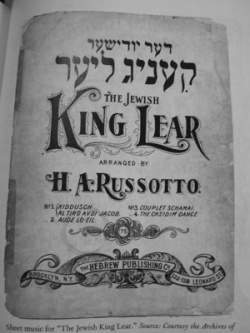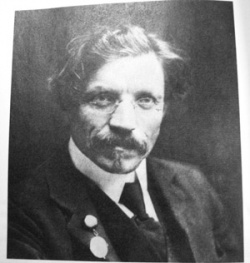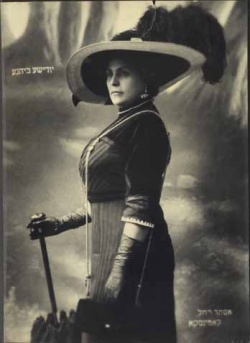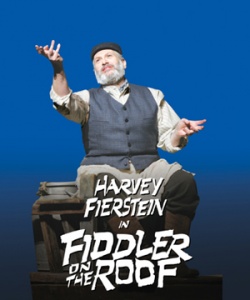From The Peopling of New York City
Contents |
Yiddish Theater
Since drinking is generally frowned upon in Judaism, as is raucous behavior, the Jewish immigrants did not have the same bars and pubs for entertainment that many other groups had. Instead, they developed an affinity for theater.
Yiddish theater is thought to originate from the tradition of dramatizing the book of Esther every year on the holiday of Purim. A Russian Jew by the name of Abraham Goldfaden, recognized as the first Yiddish playwright, originally wrote poems and songs in Hebrew and Yiddish. In 1876, after failing attempts at business and journalism, he began to write plays for his own troupe, traveling around Russia for several years. Other groups were formed as well, but were short-lived. In 1883, the czar placed a ban on all Yiddish theater in Russia, forcing the up-and-coming actors to look elsewhere for jobs.
The first professional Yiddish theater group in America arrived in 1884 led by playwright Joseph Lateiner, and in under two decades there were three large Yiddish theaters on the Bowery, each with about 3,000 seats. Together they consisted of eighty actors and over ten playwrights, with a combined turnout of over three hundred plays during their operation.
Yiddish theater thrived on the Lower East Side, presenting classic works such as King Lear in Yiddish, as well as original titles, such as those by Sholom Aleichem, a writer and playwright. On the first four weekdays, the theaters were sold to clubs and unions; on weekends (Friday—Sunday) individuals could buy tickets for twenty-five cents to a dollar.[1]
Personalities
Playwright Sholom Aleichem (born Solomon Rabinowitz, 1859), known to some as the Jewish Mark Twain (because his name is also a pun; see Jewish Immigrants and Language:Greetings), wrote many novels and plays about Jewish life in Europe. He started his career writing in Hebrew, but it was his Yiddish literature that at age twenty-four earned him wide acclaim. Late in his life, Sholom Aleichem emigrated to New York, where he died in 1916.[2][3]
One of the most well-known actresses of Yiddish theater was Ida Kaminska. She was born in 1899, the daughter of a Yiddish actress Esther-Rachel Kaminska. Her career spanned most of the brief history of Yiddish theater, beginning in Poland just after WWI. After the second World War, she co-founded the Jewish State Theater in Warsaw, and immigrated with her second husband to the United States in 1968. [4]
Contributions to American Entertainment
Once the Jewish immigrants became settled, they started to spread out, and those with skills in entertainment went to seek a market for their talent. The late nineteenth- and early twentieth-centuries saw the development of the motion picture industry, and Jewish immigrants seized the opportunity for business. Louis B. Mayer, a Russian-born immigrant, together with two others, founded MGM (Metro-Goldwyn-Mayer) in 1924, which went on to produce some of the most successful films of the time, such as Mutiny on the Bounty, The Good Earth, and the Marx brothers' A Night at the Opera. A large percentage of the employees of the company were also Jewish, many of whom were actually Mayer's relatives (so many in fact, that people joked that MGM stood for "Mayer's gantze mishpokha", Yiddish for "Mayer's whole family"). Other giants in the industry included Ben Hecht, the Warner brothers (Harry, Jack, Sam, and Albert), and David O. Selznick, producer of Gone with the Wind. Even in this Jewish-dominated industry, producers were uneasy with allowing their Jewish side to come out, for fear of alienating viewers of the general population. Thus, many entertainers then and for years to come changed their names to disguise their Jewish roots. The following is a list of well-known entertainers identified by their popular names, and their given names:
Irving Berlin . . . . . . . . . . . . . . . . . . . . . . . . . . Israel Baline
George Burns . . . . . . . . . . . . . . . . . . . . . . Nathan Birnbaum
Eddie Cantor . . . . . . . . . . . . . . . . . . . . . . . Isidore Iskowitch
Rodney Dangerfield . . . . . . . . . . . . . . . . . . . . . Jacob Cohen
Kirk Douglas . . . . . . . . . . . . . . . . . . . . . . Issur Danielovitch
Woody Allen . . . . . . . . . . . . . . . . . Allen Stewart Konigsberg
Bob Dylan . . . . . . . . . . . . . . . . . . . . . . . Robert Zimmerman
Although the Jewish presence in entertainment has decreased, it is still there to some extent, with such personalities as Steven Spielberg and Mel Brooks (born Melvin Kaminsky). [5]
- Return to Entertainment
- Return to Jewish
References
- ↑ Meltzer, M., (1996). A History of Jewish Life from Eastern Europe to America. Northvale: Jason Aronson.
- ↑ Meltzer, M., (1996). A History of Jewish Life from Eastern Europe to America. Northvale: Jason Aronson.
- ↑ Society, A., (1999). American Jewish Desk Reference. New York: Random House.
- ↑ http://www.yivoinstitute.org/exhibits/kaminska_fr.htm
- ↑ Telushkin, J., (2002). The Golden Land. New York: Harmony Books.



